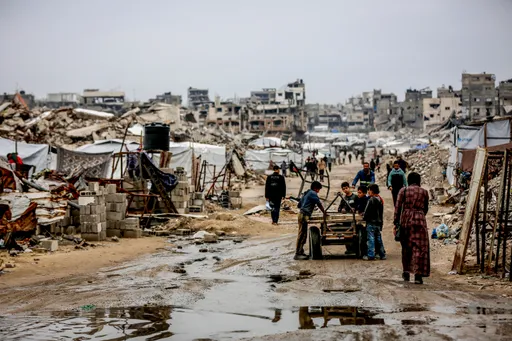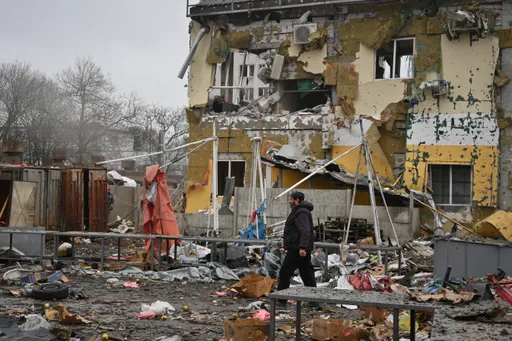In recent weeks, a handful of high-ranking Golden Dawn members have testified in the ongoing trial of the party, shedding light on the neo-Nazi party’s internal operations and violent attacks on political opponents and migrants.
In September 2013, Golden Dawn member and cafeteria employee Giorgos Roupakias stabbed and killed 34-year-old anti-fascist rapper Pavlos Fyssas in Keratsini, a suburb of the port city Piraeus.
In the wake of Fyssas’s murder, authorities cracked down on Golden Dawn, arresting dozens of members in a massive operation that targeted the party.
Since April 2015, 69 Golden Dawn members- including much of the party’s leadership- have been on trial for charges including allegedly operating a criminal organisation.
What’s Golden Dawn’s history?
In 1980, Nikos Michaloliakos, who had a history of violent crimes and far-right activism, founded a national socialist journal called Golden Dawn.
Five years later, Michaloliakos registered the political association Popular National Movement – Golden Dawn, shortly after breaking away from the ultra-nationalist National Political Union.
Documents from that period demonstrate Golden Dawn’s adherence to National Socialism – the ruling ideology of Nazi Germany – and photographs show prominent members posing in front of Nazi flags and performing fascist salutes.
Although Golden Dawn occupied the political fringes, members of the group carried out a number of attacks in the early 1990s, most notably during demonstrations over the Macedonia name dispute between Greece and its northern neighbour.
Following the widespread upheaval over the Macedonia dispute, Golden Dawn registered as a political party in 1993.
But Golden Dawn found little success in the early years following its recognition as a political party. During the 1994 European Parliament elections, the party garnered less than a percent of the vote nationwide.
In September 1996, Golden Dawn participated in legislative elections for the first time, but the outcome was again unimpressive: the party only 4,487 votes around the country, less than a single percentage point.
Meanwhile, Golden Dawn continued to build a base of hardline followers, many of them regularly engaging in violence.
In 1998, prominent Golden Dawn member Antonis Androutsopoulos participated in the brutal beating of leftwing student activist Dimitris Kousouris, who was subsequently hospitalised for severe injuries. (Years later, Androutsopoulos was convicted of attempted murder for that incident.
Violence
Golden Dawn christened its long wave of violence against political opponents in the early 1990s.
In December 1992, party members are believed to have executed attacks on leftists and other political opponents after massive demonstrations over the country’s longstanding name dispute with its northern neighbour, Macedonia.
Investigative reporter Dimitris Psarras, author of several books on Greece’s radical right, was one of the few journalists closely tracking the organisation in its early years. “They had to show that they were different,” he told TRT World, “so they carried out these attacks.”
In 1998, a prominent Golden Dawn member Antonios “Periandros” Androutsopoulos assaulted Dimitris Kousouris, a leftwing student activist who had to be hospitalised owing to his injuries.
“Only then the system began to [understand],” Psarras explained of the 1998 incident.
The attack shocked many, but most observers still predicted that the party would not make much headway in electoral politics, pointing to its poor performance in 1994 European Parliament elections and 1996 legislative elections.
The party briefly dissolved in 2005, but party chief Nikos Michaloliakos announced in 2007 that Golden Dawn had resumed its political activities.
Although still largely on the outskirts of Greek politics, the party gradually constructed a base of hardline supporters.
When the global financial crisis, which started in 2009, started to send Greece’s economy plummeting in 2010, Golden Dawn was confronted with an opportunity.
Far-right violence targeting leftists and immigrants surged around the same time that party leader Michaloliakos landed a seat on the Athens city council in 2010.
The international watchdog Human Rights Watch documented 51 “serious attacks” between August 2009 and May 2012.
As Golden Dawn and other far-right groups harnessed anti-immigrant sentiment, the number of attacks surged.
In many of the instances of violence, attackers came equipped with weapons and shouted anti-immigrant and pro-Golden Dawn slogans, the HRW report notes.
How successful has Golden Dawn been?
By the time legislative elections rolled around in May 2012, Golden Dawn had been gaining popularity – partially owing to widespread anger stemming from the country’s crippling economic crisis.
During that vote, Golden Dawn secured 6.97 percent of the vote and 21 seats, paving the way for the neo-Nazi party to enter the country’s parliament for the first time in its existence.
Because the leading parties in the May vote were unable to form a government, an additional round of elections were held in June 2012.
Yet Golden Dawn repeated its success, gaining 6.92 percent of the vote and 18 seats in the Hellenic Parliament.
In January 2015, even as the left-wing Syriza party surged in the elections and became the lead party in the governing coalition, Golden Dawn became the third largest party in the parliament.
Later that year, in September 2015, Syriza repeated its success in snap elections, and Golden Dawn retained its spot as the third largest party in the parliament.
It was not until snap elections in July 2019 that Golden Dawn lost its seats in the parliament, after failing to surpass the three-percent threshold parties must obtain to enter the Hellenic Parliament.
Murders
In August 2012, a group of men on motorcycles murdered a 19-year-old Iraqi immigrant in Athens. The killing went unsolved, but authorities suspected that Golden Dawn had been involved.
In January 2013, two men stabbed to death Shahzad Luqman, a 27-year-old Pakistani migrant worker, in the capital. When police subsequently raided their homes, they found Golden Dawn pamphlets and weapons. (Both men are currently named as defendants in the ongoing trial of Golden Dawn.
Later that year, in September 2013, Golden Dawn member Giorgos Roupakias fatally stabbed a 34-year-old anti-racist rapper, Pavlos Fyssas, in the Keratsini area of Piraeus.
Fyssas’s death proved to be a turning point, and authorities belatedly clamped down on Golden Dawn. Dozens of members—including most of the party’s leadership—were arrested and slapped with a host of charges.
The trial
Although the trial initially did little to detract from Golden Dawn’s support, the legal proceedings have been costly.
Additionally, worrisome revelations that have emerged throughout the trial detail the extent of the party’s involvement in organised violence and potentially criminal activities.
Throughout the trial, a harrowing theme has been the complicity of many locals and Greek authorities during the bloodiest periods of far-right violence.
In 2016, migrant fishermen from Egypt testified about Golden Dawn attacks four years prior in Perama.
Explaining that he and others were targeted because they were foreign-born nationals, Egyptian fish shop owner Ahmed Abu Hamad recalled 15 black-clad men arriving at a home where he lived with several others in June 2012.
“I saw them face-to-face,” he said, as reported by the Greek daily Kathimerini at the time, adding that he believed his attackers targeted them because “we are Muslims, dark-skinned and they want us out of the country”.
Tapped phone calls entered into evidence have revealed close ties between Golden Dawn members and some Greek police officers.
In recent weeks, high-ranking Golden Dawn members have taken the stand and attempted to deflect responsibility for members’ actions.
Party leadership has also sought to downplay Golden Dawn’s links to neo-Nazi ideology.
Golden Dawn member Ilias Panagiotaros, a former parliamentarian, addressed the court earlier this month, claiming that the party had banned supporters from using the Nazi salute, Kathimerini reported.
Another former Golden Dawn parliamentarian, Kostas Barbarousis, contradicted Panagiotaros when he said the fascist salute was “the best there is” and had been unfairly “demonised”.
As the party has began to dissolve in the wake of its poor performance in July elections, some analysts believe the infighting has turned many formerly loyal members against one another.
Golden Dawn leader Michaloliakos has consistently denied accusations that the party had played a central role in organising violence. Rather, he claims that the ongoing prosecution was part of an effort to clamp down on the party for its ultra-nationalist politics.























